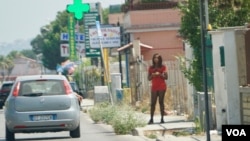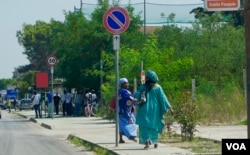Italian outreach workers say there has been a significant shift in the migration pattern from Africa with many more young Nigerian women coming. And they add that many, if not most, of the young Nigerians arriving on Italian shores know they will be expected to engage in sex work.
But the women have little idea how harsh their living conditions will be and how long it will take for them to pay off the debts they owe the traffickers who recruited them and got them to Italy.
Few of them break free from the work, according to Appiah, a 37-year-old Ghanaian migrant. “I know of four women in the last few years,” he says forlornly. “Two of them had been working for years and managed to pay back what they owed the traffickers; the other two were young and fled to Germany.”
For the last few years Appiah has been working for an Italian charity in Castel Volturno, a decaying seaside town north of Naples that’s become home to thousands of his fellow countrymen and migrant women from Nigeria. Another charity in the area says that since 2010 about one hundred Nigerian women have sought its help to break free from sex work.
Italian and European authorities estimate as many as 16,000 Nigerian women, some as young as 16 or 17-years-old, have been trafficked into Italy in the past two years by Nigerian racketeers and crime gangs, the most notorious a syndicate known as Black Axe.
The number of unaccompanied Nigerian women sailing to Italy from Libya has risen each year from 1,454 in 2014 to more than 11,000 last year and the International Organization for Migration estimates as many as 80 percent of them work once they arrive as street prostitutes for traffickers often in brutal conditions and for little pay.
Like the Italian authorities, IOM argues the Nigerian women are forced unwillingly into prostitution, tricked by traffickers, who charge the women as much as 35,000 euros for the trip to Europe. The traffickers terrify the women into submission, using violence, voodoo religious rites and threats to harm the women’s families back in Nigeria, say authorities.
Threat of violence
But the picture is more complicated, according to charity workers and migrants themselves, who suspect most of the Nigerian women who’ve arrived in the past two years — and the ones setting out now to complete a highly dangerous journey through strife-torn Niger and Libya — were not tricked by unscrupulous recruiters but knew they’d be engaged in sex work in Italy.
They say the women, most in their teens or early twenties, don’t understand how harsh their conditions will be and how vulnerable they will be, prey to violence and manipulation in a culture they struggle to understand. Breaking free isn't easy — the voodoo blood oaths traffickers make them take back in Nigeria weigh heavily on many of the women, the threat of violence is ever present and some fear their families will be harmed.
“The reality is that some of them, I would say most of them, know they will be involved in prostitution,” says Pescara-based Fabio Sorgoni, an official with the Italian charity On the Road, which helps prostitutes get out of sex work. “Some of them think they’ll be working in factories or cleaning. But a large proportion of them know they’re coming to do sex work,” he adds.
Anti-migrant rage
With anti-migrant rage mounting in Italy and populist parties demanding tough action to halt the record influx of asylum-seekers, charity and outreach workers fear speaking too openly about the motives and backgrounds of the Nigerian women arriving in Italy. They don't want to erode what’s left of public compassion for asylum-seekers.
“The pattern has changed a lot,” says Maureen, a Nigerian migrant who arrived in Italy 20 years ago, starting life here as a housemaid. Working her way through school, she’s now a case officer for the charity Associazione Jerry Masslo.
“A few years ago, yes, the women were duped by the traffickers’ and expected ordinary jobs. But those days are over…the position has changed.” Partly so, she says, because of the effectiveness of outreach programs in Nigeria warning women of the dangers.
She says many of the recently arrived Nigerian women were sex workers before in Nigeria. “Some families, often mothers, sisters and aunts urge them to make the trip, arguing it’ll just be for a few months and then they’ll be rich,” she explains.
Motivated by poverty
Poverty and the lack of job opportunities in Nigeria led them into sex work in the first place, she argues. “And they don’t understand how bad it will be for them in Italy,” she says.
Says Sorgoni: “The women don't understand 35,000 euros is lot of money. When they get here they have to stay on the streets for 14 hours a day and they get something like five or 10 euros for sex. They then realize they’ll have to be on the streets for years — forced to go with everyone, forced to have sex without a condom because many clients here demand that.”
He adds: “Many are very young, they come from rural areas and are unschooled. They don’t understand their own bodies or the infections they can get and they think all they have to do is pray, or ward off sickness with voodoo rites.”
In Castel Volturno, local doctors say nearly a quarter of the Nigerian women they treat have sexually transmitted diseases. “They fear they’ll be arrested when they arrive at the hospital,” says Dr. Beniamino Schiavone, director of Clinica Pineta Grande, a cutting-edge private hospital the government subsidizes to provide care for migrants in the area. “So they wait until their problem is terribly serious.”







